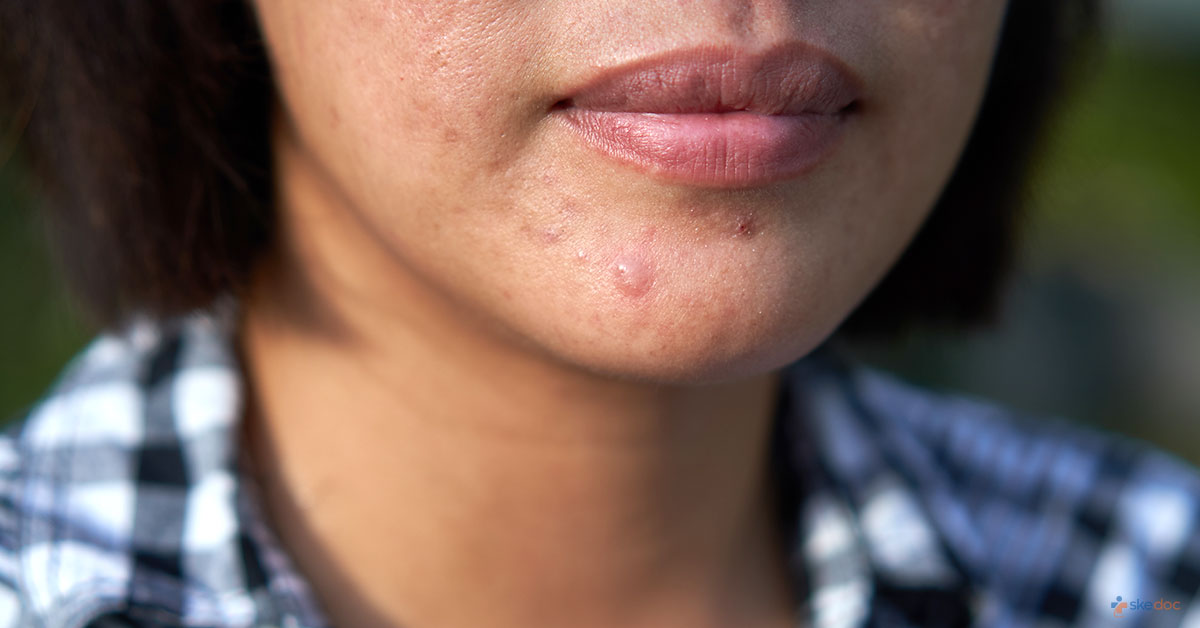Allergy
Blood Diseases
Bone & Joints
Brain
Cancer
Child Care
Cosmetic Surgery
Diabetes
Endocrinology
ENT
Eye
Gen Medicine
General Surgery
Heart
Kidney
Lifestyle
Liver & Digestive
Lung
Men’s Health
Mental health
Physiotherapy
Rheumatology
Skin and hair
Sleep Disorders
Spine
Transplant
Women Health
Thyroid
Vascular Surgery
Acne vulgaris

What is an acne vulgaris?
Acne vulgaris is a chronic skin condition that appears as red, tender, raised bumps on the skin with pus at the tips. It occurs when hair follicles get clogged with oil or dead skin cells, mostly appears on the face, shoulders, upper back, and chest.
Is acne vulgaris a medical emergency?
No, It is not a medical emergency.
Types of acne vulgaris
Depending upon the severity of the condition, acne vulgaris is classified as:
- Mild acne: Refers to the development of clogged hair follicles on the face.
- Moderate acne: Refers to the development of inflammatory papules and pustules on the face and trunk.
- Severe acne: Refers to the development of painful nodules on the face and trunk.
Causes of acne vulgaris
It can be caused due to the following reasons:
- Excessive oil production from oil glands present on the face, forehead, shoulders, and upper back
- Clogged hair follicles
- Bacterial infections
- Genetics
- Increased level of a hormone called androgen
Acne vulgaris risk factors
Risk factors that increase the risk of development of acne vulgaris include:
- Age: Acne mostly occurs in teenagers
- Hormonal changes: It can develops due to hormonal changes, which occur in teenagers or individuals using certain medications containing corticosteroids or lithium.
- Family history: Acne is inherited and is passed on from parents to children
- Pressure on the skin: Pressure caused by wearing helmets, tight collars, etc.
- Stress: High-stress levels can worsen acne
- Medications: certain birth control pills and corticosteroids can cause acne vulgaris
Triggering factors
Acne can be triggered and aggravated by:
- Hormones: An increased level of the androgen hormone aggravates acne vulgaris. This occurs during puberty in both males and females.
- Medications: Certain medications can trigger acne vulgaris, the include drugs containing corticosteroids, testosterone, lithium, iodides, or bromide.
- Dietary factors: Skimmed milk and carbohydrate-rich food can increase acne.
- Stress: Increased stress can make acne worse.
Signs & symptoms of acne vulgaris
Signs and symptoms may include:
- Whiteheads
- Blackheads
- Papules (small, red, raised bumps on the skin)
- Pimples (small, red, raised bumps with pus on the tip)
- Solid, painful lumps beneath the skin surface, called nodules
- Painful, pus-fluid lesions beneath the skin surface, called cystic lesions
Investigations
There are no specific investigations to diagnose acne. Some investigations that may be done include:
- Serum androgen levels
- Serum growth hormone levels
Diagnosis of acne vulgaris
Acne vulgaris is diagnosed on physical examination by a dermatologist and based on medical history, family history, clinical evaluation, and results of the investigations done.
Acne vulgaris treatment options
Treatment for acne vulgaris focuses on reducing oil production, reducing inflammation, and treating bacterial infections. It can be persistent. Pimples or papules can heal slowly, but they can reoccur.
A. Medical treatment
Medications administrated for treatment of acne include:
- Retinoids: Retinoid drugs include tretinoin, adapalene, and tazarotene. These drugs prevent the plugging of hair follicles.
- Antibiotics: Antibiotics include clindamycin, erythromycin, metronidazole, sulfacetamide, and tetracyclines such as doxycycline and minocycline. These are prescribed to treat bacterial infections.
- Benzoyl peroxide
- Salicylic acid and azelaic acid
- Dapsone
- Isotretinoin
- Anti-androgen agents
- Steroid injections
- Combination therapy: Some drugs are used in combination for effectively treating acne vulgaris and they include benzoyl peroxide and antibiotics, topical retinoid with an antibiotic, and topical retinoid and benzoyl peroxide.
B. Interventional treatment including surgery and indications for surgery/surgical treatment
Therapies that are implemented in acne treatment include:
- Lasers and photodynamic therapy
- Chemical peeling
- Comedo extraction: Extracting whiteheads and blackheads
- Dermabrasion
- Microneedling
- Subcision
- Dermal or subcutaneous fillers
C. Role of diet/exercise/lifestyle changes/preventive measures
Lifestyle changes and preventive measure for management of acne vulgaris include:
- Washing the face only twice a day
- Avoiding irritants
- Protecting from direct sunlight exposure
- Avoiding friction and pressure on the skin
- Refraining from touching or picking at acne lesions
- Using over-the-counter acne reducing products
Complications
Complications that result from acne vulgaris include:
- Permanent scarring of the skin
- Physical appearance with acne can cause low self-esteem and depression
Prognosis
The overall prognosis of acne is good.
When to contact the doctor/how to identify the complications?
Medical consultation for acne is recommended:
- If acne does not resolve with self-care remedies or over-the-counter treatments.
- If the symptoms of acne are severe.
Indications for hospitalization if required
Acne does not require any hospitalization.
Additional info
Greasy food intake does not cause acne or worsen acne vulgaris, acne is not caused by dirty skin. Scrubbing the skin too hard or cleansing it more than 2 times a day can make acne worse. Not all cosmetics worsen acne. Non-oily cosmetics are preferable for use on skin with acne.
Suggested clinical specialists/department to consult for this condition
- Dermatology
Was this article helpful?
YesNo




